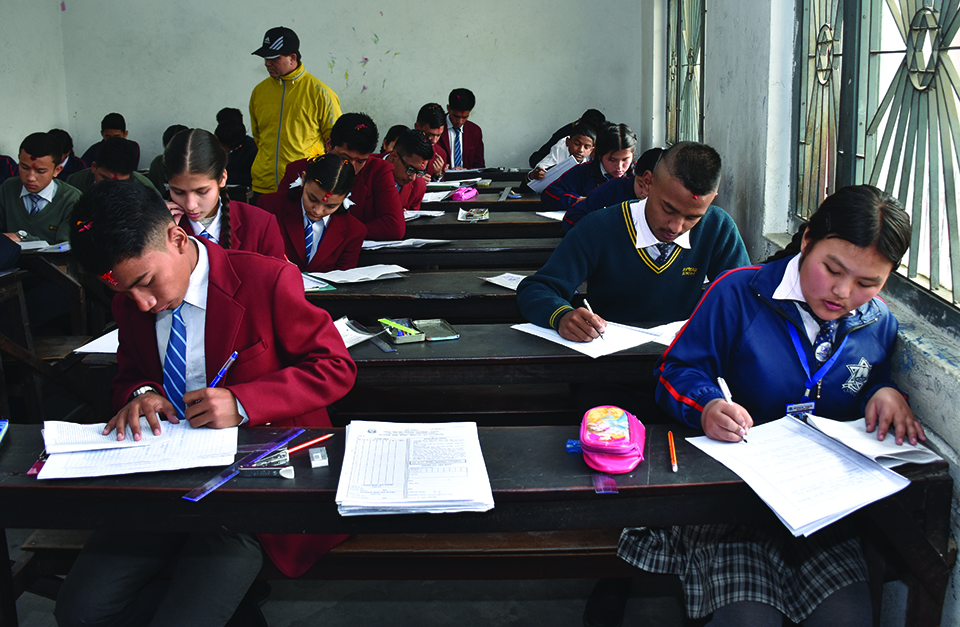
OR


Chandra Mani Bimali
The author is an English teacher at a higher secondary school based in Damaknews@myrepublica.com
More from Author
We have a shared responsibility to improve education quality by rooting out ills that plague both government and private schools
Having been in teaching profession for about one-and-half decades, I have been following debates on school education with interest. On the one hand, we have so-called die-hard, self-professed communists, who speak untiringly against privatization of education and the need to provide homogenous education to all classes of people. This, they argue, is the surest way to building an egalitarian society. On the other, there is a significant group of people, led by promoters of private schools, who point to the indispensability of private education citing the government failure to provide quality education. Private schools always talk about quality they offer, persistently referring to SEE results in which they outperform their peers in public sector. Failure of public education system is often cited as a strong rationale for need and continuation of private schools. Both arguments are narrow and one-sided. It is necessary to get the debate on right track.
Multiple flaws
Public school teachers are paid far better than their peers in private sector. They are better-qualified and competent as they get permanent teaching position in government schools only after passing highly competitive Teachers’ Service Commission (TSC) examinations. So, why do public schools perform dismally in board examinations? Why are students leaving public schools in droves?
As a teacher, it seems to me that in spite of whatever is said and billions invested, public education, like public health, has been a low key priority for successive governments in Nepal. The fact that successive governments have been silent spectators to wanton decay and decadence in public schools speaks volumes about their lack of commitment to bring in much-needed reforms.
Why is it that the government cannot bring order and discipline among teachers serving in public schools? Why are teachers derelict in their duties, examples of which are galore, not brought to book? Why is it that the regulatory mechanism that is meant to oversee education is too weak and inefficient? Why do teachers in public schools send their children to private schools? Why can’t the teachers serving in government schools be compelled to send their children to public schools? Why is it that the government, most absurdly, always sings to the populist tune of creating homogenous education for all sections of the society? These are the real pressing questions.
Private schools always cite their success in SEE and HSEB results to demonstrate quality. Disturbingly, most of us too easily believe in them. The reality is that private schools secure much better results, partly due to the fact that many of them are involved in promoting a culture of cheating and other malpractices which have become pervasive. I and many other teachers like me have first-hand knowledge in this regard. Collective indifference of monitoring agencies to stop this malpractice surprises me.
Private education in this country is slowly becoming a dirty affair. Think of MBBS exams. Rampant cheating in MBBS exams is reported frequently. If this happens in medical exam, perhaps the most regulated exam, one can imagine the level of cheating in private schools and colleges. Ask plus two students of private schools and they will probably tell you the truth of what I have suggested here. A year ago, when I asked Ram Sharma (name changed) if he cheated in the SEE exams, he replied, “I am no fool not to strike the iron when it is hot.” A studious fellow lamented, “SEE is not Parikshya (examination) it is sarikshya (cheating).”
Collective inaction
Interestingly, policymakers, politicians and bureaucrats are letting this happen under their nose, for obvious reasons. First, bad public schools don’t affect many of affluent, middle and upper-middle class people and those at policy making level because they can always send their children to private schools in and outside the country. Why would they care about bad public schools? Private schools are just as bad but there is a general impression that they are good. The government looks more interested to send youth abroad for studies than improving education quality in Nepal.
Private school organizations like PABSON and N-PABSON wield considerable influence on upper echelons of political and bureaucratic circles. Despite having two-thirds majority, the government of K P Oli could do nothing even while private schools refused to roll back the fees at the start of this academic session. Ironically, the government is willing to take on Dr Govinda KC and his followers who are fighting against commercialization of medical education but fails to tame private school owners.
We need a serious debate on education. Unfortunately, much of the debate centers on homogeneous education which, in reality, is nothing but a communist utopia. Pitting public and private schools against one another does not help. We have a shared responsibility to improve quality by rooting out ills that plague both government and private schools.
Let’s debate how best we can improve school education. Only quality education will usher in a new era of peace and prosperity, which we all look forward to.
The author is an English teacher at a higher secondary school based in Damak
mani84014@yahoo.com
You May Like This

Managing wastes
Unmanaged waste has adverse impact on public health and economy. The government should manage it properly ... Read More...

It’s government’s job
A sports stadium is a public asset which will benefit the entire country. Therefore, the government, not private entities like... Read More...

Open your mind
Government should raise public awareness and introduce mental health policies in order to improve psycho-social wellbeing of the citizens ... Read More...





Just In
- NRB introduces cautiously flexible measures to address ongoing slowdown in various economic sectors
- Forced Covid-19 cremations: is it too late for redemption?
- NRB to provide collateral-free loans to foreign employment seekers
- NEB to publish Grade 12 results next week
- Body handover begins; Relatives remain dissatisfied with insurance, compensation amount
- NC defers its plan to join Koshi govt
- NRB to review microfinance loan interest rate
- 134 dead in floods and landslides since onset of monsoon this year












Leave A Comment